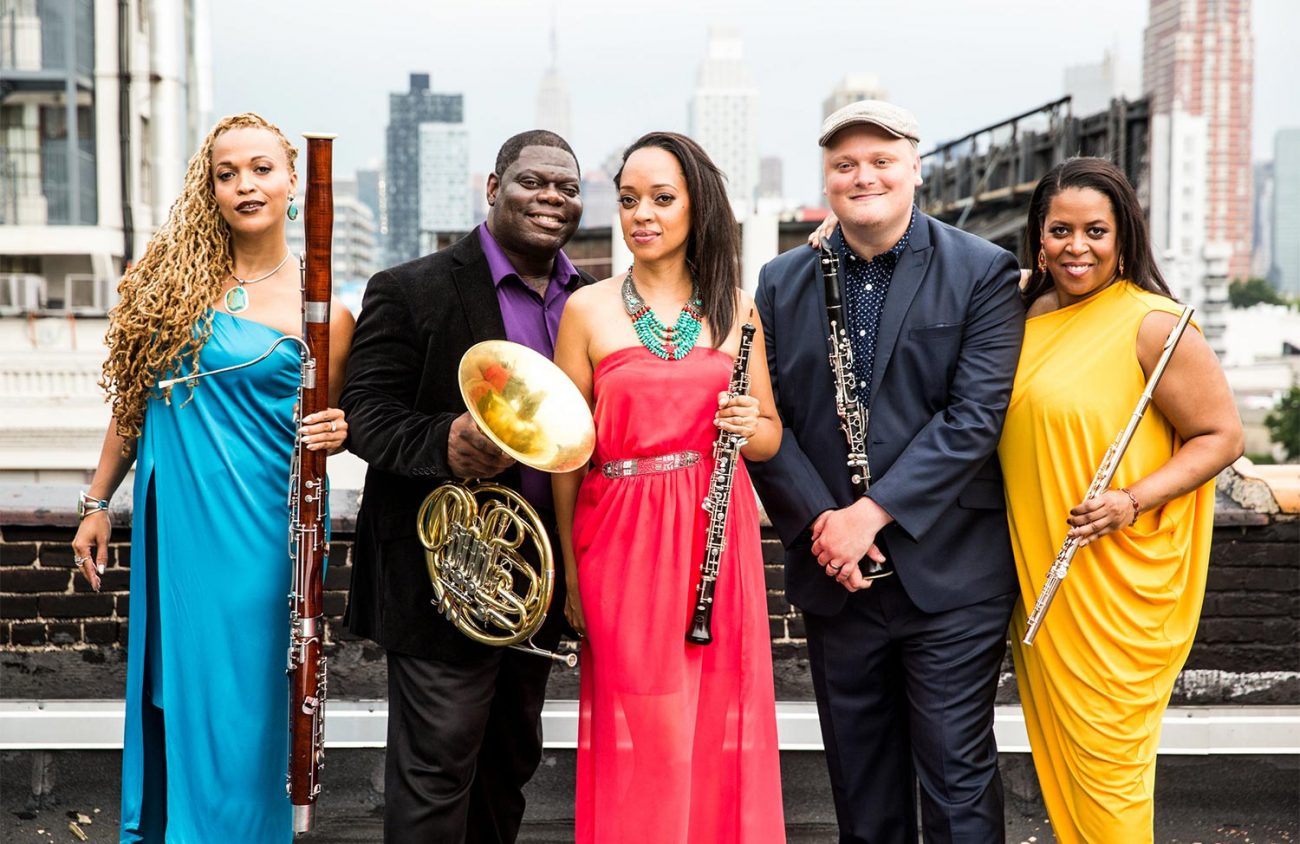At a composers panel discussion at last summer’s Chamber Music Northwest (CMNW) festival in Portland, Imani Winds hornist Jeff Scott noted that the wind quintet’s values arise in part from its music.
Unlike a string quartet, “a wind ensemble is celebrating the differences among instruments, rather than the homophony of string or sax quartets,” he pointed out.
“Chamber music,” Scott adds, “more than orchestral music, allows the individuality of the musicians to shine through to audiences because there’s no conductor intermediary. The musicians are allowed to establish their own individuality and tradition.”
Since its founding in 1997, Imani Winds have been celebrating differences and creating new traditions. The New York-based group is not only the world’s leading wind quintet, but also one of classical music’s too-few ensembles composed of musicians of color.
Moreover, unlike most performing ensembles, Imani boasts two first-rate composers, Scott and flutist Valerie Coleman, who both write some of the most fascinating chamber music being created today.
Imani Winds returns to Eugene June 30 in an Oregon Bach Festival concert, then heads up to Portland for this summer’s CMNW, where last year they succeeded the storied, older, all-white, all-male Emerson Quartet as artists in residence.
They also performed a recent weeklong spring CMNW residency, including performances at Oregon Museum of Science and Industry planetarium, Hillsboro’s Walters Cultural Arts Center and with BodyVox dance company.
“We’ve been coming to Oregon every two or three years for 15 years,” Scott recalls.
“The audiences have been so nice to us,” says oboist Toyin Spellman-Diaz. “It’s hard to think of nicer audiences than in Portland and Eugene.”
The feeling is mutual. Imani has cultivated a substantial, diverse and enthusiastic audience. Their skill as musicians plays the biggest role, of course — they’re among the finest of all chamber performers. But their genuinely enthusiastic, refreshingly un-canned stage charisma, as well as their audience-conscious programming, also encourage broader listenership than most classical-music concerts’ traditionally narrow demographic.
“Just by who we are, we look a little bit different than most classical music ensembles, so that automatically makes people think we’re going to be a little different from what you’re expecting in a classical music concert,” Spellman-Diaz explains.
“But we also spend a lot of time programming gratifying listening for everyone,” he adds. “So we try to have at least one classical work on the program, and then we might combine that with some world music and some jazz based repertoire.”
Case in point: Their Bach Festival concert includes an inventive arrangement of movements from a popular classic, Rimsky-Korsakov’s luscious Scheherezade. They’ve also Imanified Gustav Holst’s The Planets and Stravinsky’s The Rite of Spring, and have a lively arrangement of 20th-century Argentine nuevo tango master Astor Piazzolla’s Contrabajissimo as well as a spirited romp through avant garde composer George Ligeti’s Six Bagatelles.
Best of all, the show features two lively originals by Coleman (who’s on temporary leave, replaced by Julietta Curenton), Red Clay And Mississippi Delta and Tzigane, which shares a name, Roma influences and danceable dazzle with Ravel’s virtuoso showpiece.
Reena Esmail’s incandescent The Light Is the Same, based on the Sufi poetry of Jalal al-Din Muhammad Rumi, uses Indian scales and rhythmic devices. It emerged from the group’s Legacy Commissioning Project, which has spawned 20 new works so far.
“That’s what Imani Winds is most proud of,” Spellman-Diaz says, “expanding the repertoire by adding new sounds. We’re constantly listening to new composers, trying to think of ideas to link your program together and make a theme that inspires the audience and the performers to feel like you’re in a special space.”
Imani has worked with jazz musicians like Jason Moran, Wayne Shorter and Edward Simon, world music performers like Simon Shaheen and Paquito d’ Rivera, and many other non-“classical” composers.
“With so much Bach and Beethoven, you’re only going to get a certain demographic over the long haul,” Scott explains. “You have to do things that are interesting enough for a wider variety of folks.”
Imani’s diverse, enthusiastic audiences, too, celebrate the differences.
Imani Winds performs 7:30 pm Saturday, June 30, at the University of Oregon’s Beall Concert Hall. Tickets at oregonbachfestival.com.
